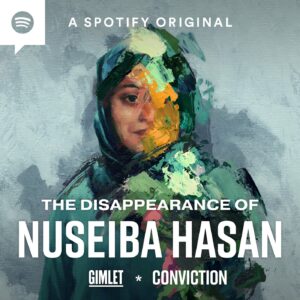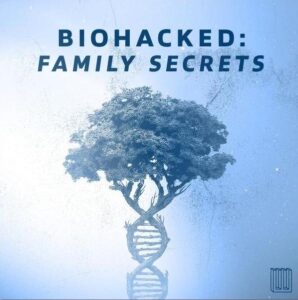Is it really that time again? No sooner had the (digital) ink dried on my last column, a whole new crop of true crime pods had sprouted their darling little heads out of the deep New England tundra in which this Floridian currently finds herself.
As of this writing, I’m still (fingers crossed, knock wood, and all that) in one piece after six weeks of snowboarding, but my all-consuming obsession with all things Elizabeth Holmes has, fortunately or not, not abated. While some outlets have pilloried Hulu’s new pod-to-screen adaptation of The Dropout as nothing more than a rehashing of the ABC podcast, I’m like, why is that a bad thing? More of anything—especially when it comes to true crime—is always a good thing.
As someone who is currently writing a novel about a grifter (of sorts), I never tire of examining the inner workings of such ne’er-do-well characters, whether they be Adam Neumann, Pam Hupp, Dr. Christopher Duntsch (a.k.a. Dr. Death), or Elizabeth Holmes.
These 8 pods, with their tales of grifters, love affairs gone way wrong, and unsolved murders, will keep your eardrums warm until summer.

Scoundrel: History’s Forgotten Villains (KAST Media) – Premiered February 23
Rascal. Rapscallion. Reprobate. Rogue. There are so many words for “bad actor” in the English language (and I mean “bad actor” in the legal, not Tommy Wiseau, sense), but perhaps none so satisfying on the tongue as “scoundrel.”
I, like Ben Yagoda reveals himself to be in the aforehyperlinked article, am an absolute etymology nerd. The pleasure to be found in tracing a single word’s origins is not unlike that of unspooling a true-crime mystery, whether through “armchair detective” social media feeds (please do not take this as a directive to “go real life”), podcasts, and/or documentaries. (Speaking of docs, in what is perhaps a show of how much I’m craving warmer weather, I’m currently devouring Hulu’s six-part docuseries City of Angels | City of Death, which traces the string of serial killers that haunted Los Angeles in the ‘70s and ‘80s.)
Like many real-life and fictional ne’er-do-wells, the word “scoundrel” is of obscure etymological origin. It might share the same root as “shun,” which comes from the Old English scunian (“to shun, avoid; abhor; desist, abstain; to hide, seek safety by concealment”), though it might also be of Old French extraction (escondre, meaning “to hide, to hide oneself.”)
If, like me, you grew up in two decades after the Sunset Strip and Toolbox Killers preyed on Tinseltown, you probably associate the word “scoundrel” with people like this guy, this guy, and definitely this guy.
Until recently, I too was one of those people who couldn’t help but picture a cheesy Fabio lookalike (or the real thing), hand-painted rippled pecs and all, upon hearing the word “scoundrel.”
That is, until I found Scoundrel. KAST Media’s newest offering, a bi-weekly anthology series, combines two of my favorite things: true crime and history. Like a salacious peak-TV period drama (are you watching The Gilded Age yet, btw?), Scoundrel digs into the darker details of some of history’s worst actors, including Sidney Gottlieb, CIA “Poisoner-in-Chief” and architect of a barbaric Cold War-era mind-control program; nun-turned-seductress-turned-murderess Sister Virginia Maria; and Iron Mike Malloy, who survived not one, not two, but eight attempts on his life by members of what became known as “the Murder Trust,” a life-insurance fraud ring.

Conviction: The Disappearance of Nuseiba Hasan (Spotify/Gimlet)- Premiered February 22
“There are a lot of people who don’t want me to tell this story,” host Habiba Nosheen says in the first episode of this series. “Because it’s filled with secrets. Secrets that some people have spent a lifetime protecting.”
In 2019, Nosheen received an email that would alter the course of her career as an investigative journalist.
The anonymous sender claimed to have information about the disappearance of Nuseiba Hasan, a 26-year-old Jordanian-Canadian who went missing in 2006. Up to this point, Nosheen hadn’t heard the name Nuseiba Hasan. As she began investigating Hasan’s story, Nosheen discovered a number of parallels between Hasan’s life and her own. Both Hasan and Nosheen were first-generation Canadians raised in religious Muslim households. Both grew up in the Toronto area. Both women faced familial strife that led them to run away from home as teenagers. Nosheen went on to have a successful journalism career while Hasan, as Nosheen puts it, “just dropped off the face of the earth,” with no one seeming to notice her disappearance.
In Conviction’s third season, Nosheen teams up with a young woman searching for her birth parents. The pair unravel Hasan’s story, uncovering long-buried secrets in the process.
(ed. note: An earlier version of this article incorrectly indicated that Habiba Nosheen had given up a child for adoption; Nosheen is an adoptive mother.)

Biohacked: Family Secrets (Sony/Three Uncanny Four) – Premiered March 9
Over the last few years, the popularity of spit-in-a-tube DNA tests (not to mention the spate of big-time genetic genealogy solves—here’s looking at you, Golden State Killer) has led ordinary people to discover extraordinary things about the circumstances of their conception.
Whether it’s uncovering ne’er-do-well fertility doctors or untangling complex medical mysteries, at-home DNA kits ensure that no closet skeleton, no matter how well concealed, can remain hidden forever.
Put this one in the true crime-adjacent category (you’ll thank me later). For the past few years, journalist T.J. Raphael (who cut her teeth at The Village Voice and The New York Daily News before transitioning to full-time audio journalism) has been documenting the story of her friend Amber, a 30 year-old Brooklynite who learned (thanks to a 23andMe DNA test she received as a Christmas present) that she was the product of an anonymous sperm donation.
Biohacked isn’t just Amber’s story: Raphael delves into the stories of other individuals with donor-derived origins as well as peels back the layers of the $8 billion fertility industry, uncovering a sinister selective breeding program and the underground sperm and egg trade in the process.
In the trailer (and I promise this won’t give away any spoilers), one person who shall remain unnamed says, “Here’s this person who’s tracked me down in exactly the same manner as The Golden State Killer, and I didn’t do anything wrong.”
Over the course of its first season, Biohacked unpacks that statement, shedding light on the murky ethical territory that assisted reproductive technology sometimes entails.
If you enjoyed Dani Shapiro’s Inheritance: A Memoir of Genealogy, Paternity, and Love and/or her weekly podcast Family Secrets (forgive me for my unabashed use of Hamlet jokes, but if you haven’t read Inheritance, get thee to a book purveyor immediately!), Biohacked is the podcast for you.

Twin Flames (Wondery) – Premiered February 21
As I write this, my partner, whom (A, if you’re reading this, the right word to use here is “whom”—my obsession with grammar, like my love for you, is neverending) I met on a dating app, sits mere feet from me, typing away in front of a bank of computer screens.
While our relationship, with all its attendant quirks and inside jokes (a number of them involving the gustatory tendencies of The Mandalorian’s Grogu) is unique, the manner in which we met (rapid thumb calisthenics plus the matchmaking machinations of impossibly complex algorithms) is decidedly un-unique.
According to a 2017 study, 65% of same-sex couples met online, as did 39% of their hetero counterparts. So, despite what your boomer parents might say, meeting online (and/or via a dating app) = totally normal!
After devouring Sweet Bobby last season, I’ve been itching for another tale of online-love-gone-wrong, and, luckily, good ‘ol Wondery delivered.
What if someone (or, rather, two very attractive, very much in love someones) promised you that you could find true love? That, with the help of their online platform, you could find your “person,” your soulmate, the one person in the world with whom you were destined to spend the rest of your life?
Welcome to Twin Flames Universe, an online community founded by Michigan couple Jeff and Shaleia Ayan. According to Jeff, the platform’s video tutorials, workshops, therapy sessions will help users find their “twin flame,” a person who “was designed for you by God, and you were designed for this person by God, to be your eternal companion.”
Though these might sound like the wishful ramblings of a pair of love-happy hippies, trust me: this ride is going to get a lot weirder.
Twin Flames Universe, which has attracted upwards of 15,000 adherents to its private Facebook group (not to mention 25.5K subscribers to its YouTube channel), has some pretty extreme ideas when it comes to love.
Your twin flame might live in a different city, state, or country. They might already be in a relationship or married. You may need to change core aspects of your identity in order to attract this person. Your twin flame might not even know you exist, much less that you two are destined to be together, but don’t worry. Jeff and Shaleia, who claim to have a direct connection to God (they’ve referred to themselves as “Father Christ” and “Mother Christ” respectively), have got you covered. With their help (which, if you want the full package, is going to cost you $4,444), nothing will stand in the way of you finding your twin flame.
Jeff and Shaleia (which might not actually be their real names?) claim their operation isn’t a cult, but, as host Stephanie Beatriz (In the Heights, Encanto) discovers, when it comes to the Internet, if something seems like a grift, it probably is. In interviews with former Twin Flames members, Beatriz uncovers the exploitation, coercion, and isolation wrought by this group. Lovely!

Sacred Scandal (My Cultura/iHeartPodcasts) – Premiered December 20, 2021
Y’all. It’s like this podcast was custom-made for me. As a Catholic Floridian (okay, half Catholic, but still), how could I not include a podcast documenting the 2001 murder of a Miami Catholic school nun?
Holy Cross Academy, a prestigious Catholic school (according to the Miami Herald, Holy Cross “enjoyed a stellar academic reputation”), was located in West Kendall, a middle-class suburban enclave twenty miles from downtown Miami. On March 21, 2001, Sister Michelle Lewis, a 39-year-old novitiate (that’s pope-speak for nun-in-training) who worked as the school’s financial officer was found dead in her convent house. Lewis had been beaten and stabbed more than 90 times. 18-year-old Mykhaylo Kofel, a monk-in-training at the school, later confessed to the crime.
What might seem like a slightly strange (given the venue) but tragic open-and-shut case turns out to be anything but.
Kofel claimed to have been subjected to four years of sexual abuse at the hands of Father Wendt and Father Damian, the school’s head and his assistant. While Wendt and Damian emerged from the situation more or less unscathed (for some reason, the investigation that might have revealed whether Kofel’s claims were true was abruptly terminated), Kofel was convicted of murder and sentenced to 30 years in prison.
Heavenly hosts Paula Barros (a Holy Cross grad who was one of Kofel’s classmates) and Melanie Bartley conduct their own investigation into this two-decade-old case, digging up evidence that the original detectives and lawyers missed—including a shocking interview that casts doubt on Kofel’s guilt.

Who the (Bleep) Did I Marry (Investigation Discovery) – Premiered February 14
If there’s one thing my beloved knows about me (apart from my passion for relative pronouns), it’s that I’m a sucker for anything and everything Investigation Discovery and/or Oxygen. My “twin flames,” so to speak, are these two titans of the true crime media landscape.
I have spent many a night (pre-pandemic ones included) nestled beneath a sea of blankets, devouring shows like Oxygen’s The Real Murders of Orange County and Buried in the Backyard and/or ID’s Homicide Hunter: Lt. Joe Kenda and Deadly Women (I’d love to spend a day having Candice DeLong, in her signature sultry/authoritative voice, narrating each and every one of my banal tasks.)
Given my love for Oxygen and ID, I’ve been simply over the moon that a number of TV staples have made the small-screen-to-earbud leap, including Who the (Bleep) Did I Marry. (In case you’re wondering, it should technically be “Whom did I marry?” but talking like that sounds, well, super pretentious.) If you’re not familiar with ID’s long-running show (91 episodes and counting!), it’s pretty much what it sounds like: people find out that their ‘til-death-do-us-part soulmates have some, shall we say, pretty unsavory histories.
On the podcast version, stomp that (digital) glass and pop the champagne for several tales of noxious nuptials, including a small-town wife whose Prince Charming husband turns out to be an unfaithful murderer, a teacher whose high-school counselor poisons her with arsenic (His supposed motive? He wanted to be able to spend more time with her, which would be easier to do if she were at home and paralyzed), and the Englishman behind whose dashing façade hid a string of jilted lovers. Mazel tov!

The Rise and Fall of LuLaRoe (discovery+) – Premiered February 22
Whether or not you’re familiar with the term “unicorn” when used in conjunction with this now-infamous clothing company (hint: it refers neither to horned equines nor privately held start-ups whose valuation hits $1 billion), you need to listen to discovery+’s newest tale of a true multi-level marketing (MLM) nightmare-come-true.
For most of us, the word LuLaRoe probably conjures zanily patterned leggings (in LuLa-speak, a “unicorn” refers to any print that is extremely rare and therefore very much in-demand among acolytes.) Beneath the brand’s buttery soft leggings and promises of Facebook sisterhood lay a very dark secret: retailers, many of them stay-at-home moms and women with dreams of making bank by selling LuLaRoe leggings, were being taken advantage of. What seemed like an empowering capitalism-meets-feminism enterprise was nothing more than a pyramid scheme, one that put would-be girlbosses’ financial and personal lives in jeopardy.
In The Rise and Fall of LuLaRoe, BuzzFeed News senior culture reporter Stephanie McNeal (if you haven’t checked out her many, many deep dives into the follies and foibles of the influencer class, please do—she’s also written what is arguably the definitive article on LuLaRoe, but I’d suggest listening to the podcast first so as to avoid entering spoiler territory) conducts first-hand interviews with women who fell victim to—and are fighting back against—the company’s polyester promises.

Yuba County Five (Mopac Audio) – Premiered February 9
If you’ve read this column before, you probably know I’m a fan of anything Mopac Audio produces. That’s why, last but not least, I’m excited to recommend the indie podcast publisher’s latest offering, Yuba County Five.
As I mentioned in my last article, every so often, a podcast comes along that absolutely sucks me in. Last time, it was Tortoise Media’s Sweet Bobby. This go round, it was Yuba County Five, a pod whose myriad twists and turns will have you bingeing the series right from the get-go.
On the night of February 24, 1978, five close friends drove from their home in Yuba City (a Northern California community about 60 miles north of Sacramento) to watch their favorite basketball team, the UC Davis Aggies, play the Chico State Wildcats
The men, who ranged in age from 24 to 32 and all had mild cognitive differences and/or psychiatric conditions, had an important day ahead of them: a Special Olympics tournament they were scheduled to play in with their basketball team.
When the group didn’t return home from their outing, friends and family began to panic. Multiple factors—including a record-breaking snowstorm, the fact that four different law enforcement agencies were involved in the case, and a known-to-be-unreliable witness—complicated search efforts. The discovery of the group’s abandoned car (in Plumas National Forest, a remote wilderness area 70 miles northeast of Chico) only deepened the mystery. Why did the men end up so far in the opposite direction of home? Did they go there of their volition? Or did something—or someone—cause their disappearance? As of this writing, only four episodes of Yuba County Five are available, and the fifth one can’t drop soon enough.

















